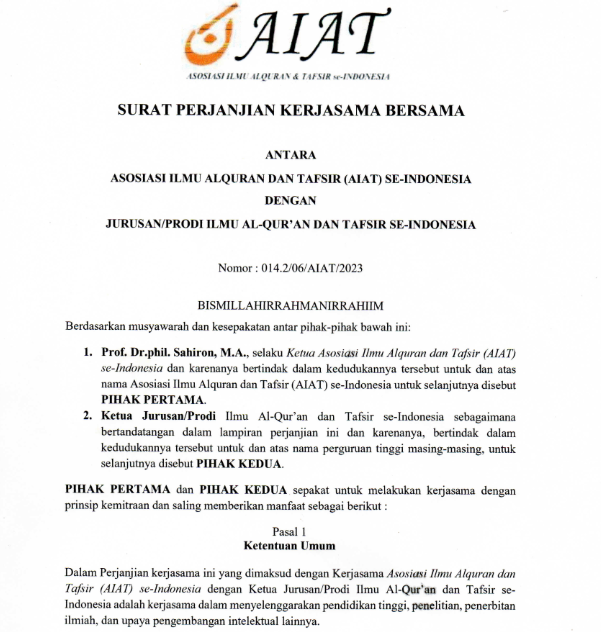Terapi Al-Qur’an untuk Menyembuhkan Penyakit:
Studi Living Qur’an dan Hadis Berdasarkan Pendekatan Fenomenologi Edmund Husserl
 Abstract views: 373
,
Abstract views: 373
,
 PDF downloads: 482
PDF downloads: 482
Abstract
Nowadays, there are several alternative treatments undertook by certain practitioners to cure a person's illness. The diseases they treat are physical or non-physical. Physical disease is a disease that can be identified by medical science, while non-physical disease cannot be identified by medical science, it is called a non-medical disease. Physical ailments are examined and prescribed by doctors or other health professionals to relieve or cure the ailments. On the other hand, non-physical ailments are given alternative treatments such as prayer or certain herbs. The problems investigated in this study are as follows. First, the phenomenon of Quranic therapy to cure physical and non-physical ailments in Sumenep. Second, the meaning of Quranic therapy to cure physical and non-physical diseases in Sumenep. Third, the view of phenomenological theory on Quranic therapy to cure physical and non-physical diseases in Sumenep. The phenomenological approach is used to analyze data about Quranic therapy to cure physical and non-physical ailments. The meaning or essence behind the phenomenon is analyzed by releasing the surrounding empirical data and situation. The results of this study are, first: Surah Muhammad is often used for the treatment of ailments by the Sumenep Pragaan community. Sick people are recited the surah in the hope that their illness will be cured. The reading of Surah Muhammad for treatment is sometimes collaborated with readings other than the Qur'an such as burdah, ratibul haddad, or shalawat nariyah. In addition to the tradition of reciting Surah Muhammad, there is also a ruqyah tradition for treatment. Ruqyah is the practice of Al-Qur'an therapy carried out by Jam'iyah Ahl al-Ruqyah Aswaja (JRA) Sumenep to treat physical and non-physical ailments suffered by people in Sumenep Regency. Ruqyah therapists recite selected verses in performing Quranic therapy. Second, the meaning of reciting the verses of the Quran for medical treatment or non-medical therapy is actually an intermediary. In other words, healing is not determined by these readings. Third, the final stage of Husserl's phenomenological analysis is transcendental reduction, understanding phenomena by tracing the roots in the consciousness that manifests itself so that pure existence or subjects can be found. The pure existence or subject of reciting surah Muhammad, Surah al-Falak, and other verses in the practice of ruqyah is the awareness that all these things are done for the sake of expecting the blessing of Allah SWT.
Downloads
References
Mas’udi dan Istiqomah. Terapi Qur’ani bagi Penyembuhan Gangguan Kejiwaan; Analisis Pemikiran Muhammad Utsman Najati tentang Spiritualitas Al-Qur’an bagi Penyembuhan Gangguan Kejiwaan), Konseling Religi: Jurnal Bimbingan Konseling Islam, Vol. 8, No. 1 (Juni, 2017).
Naisābury (al), Muslim bin Hajjāj Abū Hasan al-Qusyairy. Shahiīh Muslim. Beirūt: Dār Ihyā’ al-Turāts al-Arabi, t.th.
Pusat Bahasa Departemen Pendidikan Nasional. Kamus Bahasa Indonesia. Jakarta: Pusat Bahasa, 2008.
Nasā’iy (al), Abū Abd al-Rahmān Ahmad bin Syu’aīb bin Alī al-Khurasāny. Sunan al-Nasā’iy. Beirūt: Muassasah al-Risalah, 2001.
Ratna, Nyoman Kutha. Sastra dan Cultural Studies Representasi Fiksi dan Fakta. Yogyakarta: Pustaka Pelajar, 2010.
Ratna, Nyoman Kutha. Teori, Metode dan Teknik Penelitian Sastra. Yogyakarta: Pustaka Pelajar, 2009.
Tirmidzy (al), Muhammad bin Īsa bin Tsaurah bin Mūsa bin Dhahhāk. Sunan al-Tirmidzy. Mesir: Syirkah Maktabah wa Mathba’ah Musthafā al-Bābi al-Halaby, 1975.
Qudsy, Saifuddin Zuhri dan Subkhani Kusuma Dewi. Living Hadis; Praktik, Resepsi, Teks dan Transmisi. Yogyakarta: Q-Media, 2018.
Illias, Muhammad. Terapi Al-Qur’an dalam Upaya Pemulihan Orang dengan Masalah Kejiwaan (Studi di BLUD Rumah Sakit Jiwa Aceh), Skripsi, UIN Ar-Raniry, Aceh, 2017.
Nadhif. Efek Air Ruqyah untuk Kesembuhan Penyakit Stroke di Majelis Zikir Pengobatan Alternatif Al-Karomah Desa Jatijajar Kec. Ayah Kab. Kebumen, Skripsi, UIN Walisongo, Semarang, 2019.
Nisa, Fahrun. Terapi Kesehatan dengan Menggunakan Ayat-Ayat Al-Qur’an di Rumah Kesehatan KH. Misbahuddin Ali Desa Benda Kec. Sirampog Kab. Brebes, Skripsi, IAIN Purwokerto, Purwokerto, 2020.
Rafiq, Ahmad, The Reception of The Qur’an in Indonesia: A Case Study of The Place of The Qur’an in a Non-Arabic Speaking Community, Disertasi, Amerika Serikat: Universitas Temple.
Amien, Ach. Badri, Santri, Wawancara Langsung (16 Juli 2021).
Asmuie, Masyhudi, Tokoh Agama, Wawancara Langsung (9 Juli 2022).
Hakim, Mursyid N., Anggota Sepuh Jam’iyyah Ruqyah Aswaja, Wawancara Langsung (8 Juli 2022).
Hikam dan Istrinya, Warga, Wawancara Langsung (27 Juli 2022).
Khomsin, Warga, Wawancara Langsung (24 Oktober 2022).
Mannan, Abrori, Tokoh Agama, Wawancara Langsung (24 Juli 2022).
Mannan, Maimon, Pengasuh PP. Hidayatut Thalibin, Wawancara Langsung (16 Juli 2021).
Ridlo, Mahtum, Ketua Jam’iyyah Ruqyah Aswaja Pragaan, Wawancara Langsung (24 Oktober 2022).
Umam, Misbahul, Warga, Wawancara Langsung (26 Juli 2022).
Sabt (al), Khalid bin Usman, “Hadis (Shallu Ayyuha al-Nas fi Buyutikum..) Ila (Inna Rasulallah Amarana an La Nushila Shalatan bi Shalatin..)),” Mauqi’ Fadilah Syaikh Khalid bin Usman al-Sabt, diakses dari https://khaledalsabt.com/explanations/2755/%D8%AD%D8%AF%D9%8A%D8%AB-%D8%B5%D9%84%D9%88%D8%A7-%D8%A7%D9%8A%D9%87%D8%A7-%D8%A7%D9%84%D9%86%D8%A7%D8%B3-%D9%81%D9%8A-%D8%A8%D9%8A%D9%88%D8%AA%D9%83%D9%85-%D8%A7%D9%84%D9%89-%D8%A7%D9%86-%D8%B1%D8%B3%D9%88%D9%84-%D8%A7%D9%84%D9%84%D9%87-%D8%A7%D9%85%D8%B1%D9%86%D8%A7-%D8%A7%D9%86-%D9%84%D8%A7-%D9%86%D9%88%D8%B5%D9%84-%D8%B5%D9%84%D8%A7%D8%A9-%D8%A8%D8%B5%D9%84%D8%A7%D8%A9, pada tanggal 28 Juli 2023 pukul 13.27 WIB.
The journal operates an Open Access policy under a Creative Commons Non-Commercial Share-Alike license. All articles published Open Access will be immediately and permanently free for everyone to read and download.
• Creative Commons Attribution-NonCommercial (CC-BY-NC)

Revelatia: Jurnal Ilmu al-Qur`an and Tafsir by http://ejournal.iainmadura.ac.id/index.php/revelatia is licensed under a Creative Commons Attribution-NonCommercial 4.0 International License.
Based on a work at http://ejournal.iainmadura.ac.id.





















